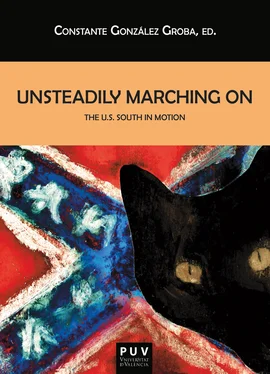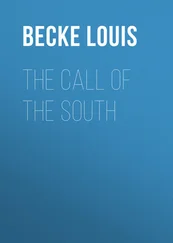But even in the South, Mabry initially finds ways of resisting his past. He seeks shelter in the fictional comforts of Gone with the Wind , a film that is referenced throughout Price’s novel: When Mabry finally reconciles with his daughter Charlotte over the phone, and she calls him “Pa,” he finds himself choking:
Not so much because of the implicit affection but because of the reminder of the heartbreaking moment in Gone with the Wind when Vivien Leigh has waded her way back to Tara through Yankee hell-and-holocaust only to find her beloved Irish father in dementia. Doesn’t she lean to kiss his curly white head and say ‘Oh Pa, don’t worry about anything. Katie Scarlett’s home’? Mabry even tried it on Charlotte now. “Katie Scarlett, dear child—”
And wondrously she got it. “Safe back at Tara. You’re in decent hands, Pa.” (189)
In fact, as Préher argues, Mabry uses the movie “as a substitute for life” because it “pictures people who, like him, cling to a way of life that has eluded them” (172). This nostalgiaembracing strategy is also apparent in Price’s characterization of the father’s African-American help Audrey Thornton. This is not just because she mimics Prissy from Gone with the Wind . Audrey is a divinity student who sacrifices much to care for Mabry’s father. Jeffrey Melnick has called Audrey a neo-Mammy for the post-9/11 age (97). And it is hard not to see her as a stereotype of the Mammy-figure. As it turns out, she not only cares for Mabry’s father, but she ends up serving as a sort of salvation for Mabry, who is in desperate need of redemption. And he finds it in Audrey, a pure, innocent female character, whose strength, rootedness, and religious beliefs serve as a contrast to Mabry’s rootless existence. Victoria O’Donnell defines the “Mammy” figure as the “southern archetype of the earth mother .... Mammy as a character is the quintessence of strength, constancy, and integrity. She is not only capable, generous, and kind but also very religious, long-suffering, and sometimes scolding” (243-44). This archetype is apparent in Price’s first description of Audrey: “... she looked like a handsome natural object somehow grown by the boards she stood on—that natural, in place, guaranteed to last” (25).
In line with the novel’s intertextual dialogue with Gone with the Wind , a pronounced sense of nostalgia saturates the narrative. Mabry displays a paradoxical nostalgia for the South (54). As Préher argues, Mabry’s focus is not on the horrors of 9/11. Instead, his attention is focused on “the Southern past” (54), and he is saddened by the realization that “the South has also lost something it will never be able to regain” (Préher 173), namely slavery, or, in the words of the narrator, “the eternal richness of the monstrous relation between whites and blacks that had nonetheless yielded more than two centuries of a daily tolerance far more complex than anything visible now in schools and stores. Well-gone, God knew, but not yet replaced with anything richer...” (54). This is a good example of “imperialist nostalgia,” which according to Renato Rosaldo is “a mood of nostalgia [that] makes racial domination appear innocent and pure.” It is based on the paradox that “someone deliberately alters a form of life and then regrets that things have not remained as they were prior to the intervention.” Furthermore, imperialist nostalgia “uses a pose of ‘innocent yearning’ both to capture peoples’ imagination and to conceal its complicity with often brutal domination” (Rosaldo 68, 70). Likewise, Mabry’s paradox mirrors what Tara McPherson describes, in her discussion of white viewers’ reactions upon watching Ken Burns’ The Civil War , as a “strain of nostalgia and melancholy inextricably mired in loss, a loss that is, but should not be, separated from the end of slavery” (124). Mabry does suffer from a guilty conscience on behalf of the southern past and makes attempts at penance but he is unable to relinquish the power structure already inherent in place in his family home.
When Mabry’s father dies, his last will is that Audrey is given the family’s house. Mabry agrees on the condition that he can stay there with Audrey taking care of his ailing body. So as a male version of the Scarlett O’Hara that he admires, Mabry gradually finds strength in the southern soil and eventually recovers his southern identity, complete with a mammy to boot.
While the two novels in many ways are realistic depictions of the aftermath of 9/11, their view of the South seems to perpetuate the stereotypes that have trivialized the region in the first place. It should be mentioned that there are writers that do not gloss over the ramifications of 9/11 in the South. The image of a South unaffected by the terrorist attacks is not mirrored in Cynthia Shearer’s The Celestial Jukebox (2005). Although it is not a 9/11 novel, it depicts how a group of Mauritian immigrants in the fictional town of Madagascar, Mississippi are treated with suspicion in the immediate aftermath of 9/11. A character also reports that that “all Mauritian men” in Kentucky “had been taken” (412-13). Being both Muslim and immigrants, the Mauritians experience the wave of anti-Muslim paranoia as well as the racial profiling that swept over the country in the wake of the terrorist attacks. This is also the focus point of Dave Eggers’s Zeitoun (2009) in which the Syrian immigrant Abdulrahman Zeitoun has stayed behind in New Orleans after Hurricane Katrina has wreaked havoc. But he becomes a victim of the paranoia, racial profiling, Islamophobia, and incompetent bureaucracy—all a result of the Bush Administration’s reaction to 9/11. Mistaken for a terrorist, Zeitoun is taken away by six armed officers. For more than a month he is held captive, without charges, and refused medical services as well as a phone call to his wife.
While writers like Shearer and Eggers do not shy away from some of the ugly and troubling ramifications of 9/11 in the South, McInerney and Price seem content with relying on established and well-worn stereotypes to forge narratives of hope and redemption. As Richard Gray argues, by relying on a familiar pattern, the “romance pattern” of The Good Life (30) and the “initiation novel” of The Good Priest’s Son (53), the unfamiliar is simply assimilated “into familiar structures. The crisis is, in every sense, domesticated .... The ‘worst day’ becomes... the occasion of rehearsing and replaying a deeply traditional narrative” (30, 53). The modern world may be falling apart, but, according to Price and McInerney, the South is fortunately not a part of it.
Works Cited
Arbeit, Marcel. “A Place of Growing Up, or Getting Lost: New York and Southern Writers.” New York: Cradle of America’s Cultural Plurality . Eds. Michael Peprník and Matthew Sweney. Olomouc: Palacký University, 2007. 37-62.
Amis, Martin. “The Voice of the Lonely Crowd.” The Guardian (June 1, 2002). < http://www.guardian.co.uk/books/2002/jun/01/philosophy.society>.
Baelo-Allué, Sonia. “9/11 and the Broken City: Jay McInerney’s The Good Life .” Paper presented at the European Association for American Studies conference, Oslo, May 2008.
Bell, Madison Smartt. The Color of Night . New York: Vintage, 2011.
Bose, Supid. “A Man Who Learns the Steps It Takes to Go Home Again.” The Washington Times (July 31, 2005): B08.
DeLillo, Don. “In the Ruins of the Future.” Harper’s (December 2001): 33-40.
Eggers, Dave. Zeitoun . New York: Penguin, 2009.
Everett, Percival. The Water Cure . Saint Paul, MN: Graywolf Press, 2007.
Читать дальше












